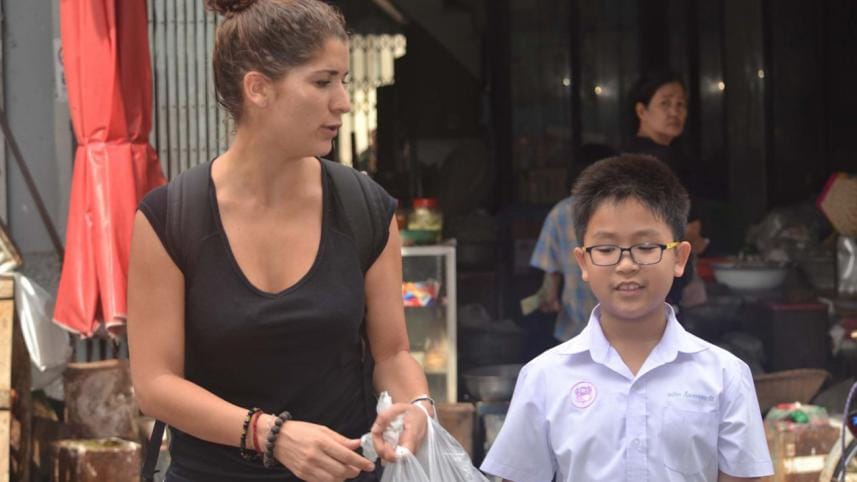Thai family opens doors to tourists to help boys learn English

A family in Phitsanulok's Muang district in Thailand has opened its doors – with free accommodation for foreign backpackers to expose their two young sons to everyday use of English.
The aim is to equip their children with English-language proficiency to benefit their futures. And the move appears to have worked.
The boys – one a Mathayom 1 student and the other Prathom 6 – have gained more confidence, improving their English and are able to lead tourists whom the family meets via the Couchsurfing travel community website to visit a local market, temples and other attractions in the province.
Xingmin School sixth-grader Panapat Liamtrakulpanich eagerly led his family's latest guest, a Swiss woman identified only as Yasmina, 27, through the busy Talad Tai morning market last week to show local people's lifestyles and cuisine, and sample the fruit and delicious snacks.
Speaking English with confidence, the boy explained interesting products for sale to the Swiss woman while local merchants observed the interaction with awe. The boy said he was happy to explain things to a foreign guest, as it had helped him improve his English and confidence.
Monchai Liamtrakulpanich, 48, the boy's father also walked with them to give advice to his son and their guest.
Coffee shop owner Monchai said he and wife Pentip wanted their sons, Palapat and Panapat, to speak English fluently as it would help their education, academic performance and career. The family had encouraged the boys to speak English at home since they were very young and sent them to English tutoring classes taught by foreign teachers.
Monchai learnt of the Couchsurfing community that can connect foreign tourists visiting Thailand with Thai residents who are happy to allow them to stay at their homes – and thought it would be a good opportunity for cultural and language exchange that could boost the boys' English skills.
He offers free accommodation and meals to foreign visitors in exchange for their companionship and willingness to help the boys practice their English.
Over the past year, he has welcomed 20 such tourists, mostly people travelling alone on a budget, who generally stay with the family for one or two days before moving on, he said.
He encouraged the boys to take the visitors to the market and to see the local neighbourhood on weekdays and to temples and attractions on the weekends.
Monchai said it was essential that Thai children learn to speak English, as it is the universal international language. While enrolling the children in bilingual schools was expensive, connecting with tourists via the travel community was an good option to help them improve their language skills, he said.
The family's Swiss guest said she was travelling alone and planned to visit Thailand for two months before heading to Myanmar. She said her stay with the family and their hospitality, especially Pannapat taking her around to visit local places, had been enjoyable and helped her to learn more about Thai culture.



 For all latest news, follow The Daily Star's Google News channel.
For all latest news, follow The Daily Star's Google News channel.
Comments